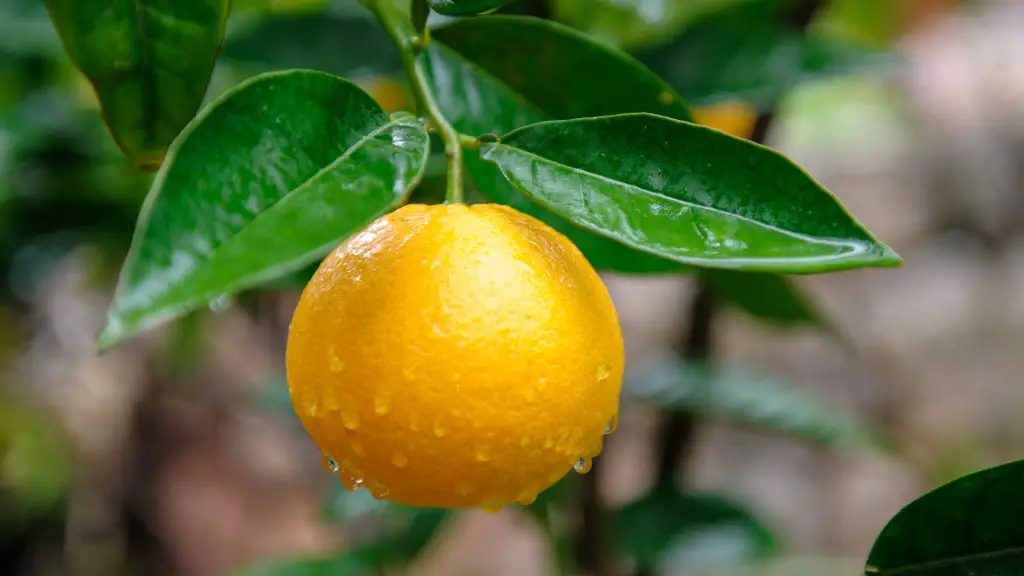Lemon trees can add beauty and a distinctive aroma to any garden. The question many people ask is, will my lemon tree actually grow lemons? The answer is yes, but there are some important steps that need to be taken in order to ensure that your lemon tree yields a crop of juicy, delicious lemons.
Watering and fertilizing are key to keeping your lemon tree healthy. Lemons need plenty of water and fertilizer to be able to produce an ample harvest. Be sure to use a fertilizer that is specifically tailored to citrus trees. Lemons prefer acidic soils, so organic materials like garden compost, aged manure, and chicken manure are all great sources of nutrients.
Sunlight is incredibly important for lemon trees. They need consistent access to full sunlight in order to produce fruit. If your lemon tree is placed in an area that doesn’t receive enough sun, then it won’t produce any lemons. It’s also important to ensure that the lemon tree gets enough airflow.
Maintaining a regular pruning schedule is essential. Pruning will keep your lemon tree healthy and produce more plentiful and flavorful fruit. Pruning should be done during the winter, before new growth begins in the spring. Proper pruning techniques should be followed when doing so.
Disease can be an issue for lemon trees. The key to preventing diseases is to keep the area around your lemon tree free of weeds and other plants that may harbor pests or diseases. Regular monitoring of your lemon tree is recommended in order to spot any potential issues and address them as quickly as possible.
If you take all of these steps, your lemon tree will end up bearing beautiful, abundant fruit. You don’t have to be a professional gardener to grow a lemon tree; all it takes is a little patience and dedication. Your lemon tree will thank you with a thriving crop of juicy, delicious lemons!
Watering
Water is essential for a successful lemon crop, as lemon trees are native to tropical and subtropical climates which naturally receive ample rain. Without water, there won’t be any lemons. Lemon trees should ideally receive at least one inch of water per week, whether from rainfall or supplemental irrigation. As for the soil, make sure to use a light, slightly acidic soil. If you water the lemon tree too much, it can cause the fruit to become watery and tasteless. So make sure to be mindful of how much water you are using on your lemon tree.
Fertilizing
When fertilizing your lemon tree, use a fertilizer that is specifically tailored to citrus trees. Using a fertilizer formulated for other plants won’t be beneficial to your lemon tree. Fertilizing should be done carefully, in order to avoid over-fertilizing. A good rule of thumb is to fertilize your tree every two months, using a fertilizer that is tailored for citrus plants. To add nutrients to the soil of your lemon tree, you can also use organic materials such as garden compost, aged manure, and chicken manure. These materials will give your lemon tree the nutrients it needs while also helping to increase the acidity of the soil. In addition, pruning should be done regularly. It’s important to prune your lemon tree so that it will grow in an upright shape and produce healthy fruit. Pruning should be done during the winter, before new growth begins in the spring.
Sunlight
Lemon trees need plenty of sunlight in order to produce fruit. Placing your lemon tree in a location that receives at least five hours of direct sunlight per day is crucial. If your lemon tree doesn’t receive enough sun, it won’t produce any fruit. Lemon trees should not be placed in any overly shady spots, as the fruit won’t be able to ripen without adequate sunlight. So make sure to place your lemon tree in a location where it will get enough sunlight.
Pests and Diseases
Pests and diseases can be a major problem for lemon trees, so it’s important to regularly monitor your lemon tree for any potential problems. Disease can spread quickly, so you should address any issues as soon as possible. Common pests and diseases include scale, aphids, silverleaf, and bacterial canker. Keeping weeds and other plants away from your lemon tree can help to prevent pest and disease problems. You should also take the time to inspect your lemon tree regularly, so that you can spot any problems early on.
Harvesting
When it comes to harvesting your lemon crop, timing is key. It’s important to wait until the fruits are fully ripened before picking them. A lemon that is too immature or unripe will not be as sweet or juicy as it should be. To check for ripeness, gently squeeze the lemon fruits. If they are soft, then they are ready for harvesting. You should also use a sharp knife to cut the fruits from the tree, as this will decrease the risk of damaging the plant.
Storage
When it comes to storing your lemon crop, it’s important to use airtight containers. This will keep the fruits from spoiling too quickly. Lemons can be stored in the refrigerator for up to two months. If you need to store them for longer, you can freeze them by first removing the skins, slicing them into wedges, and then freezing them. This will help to preserve them for up to a year. For longer-term storage, you can also dry or pickle your lemons.



